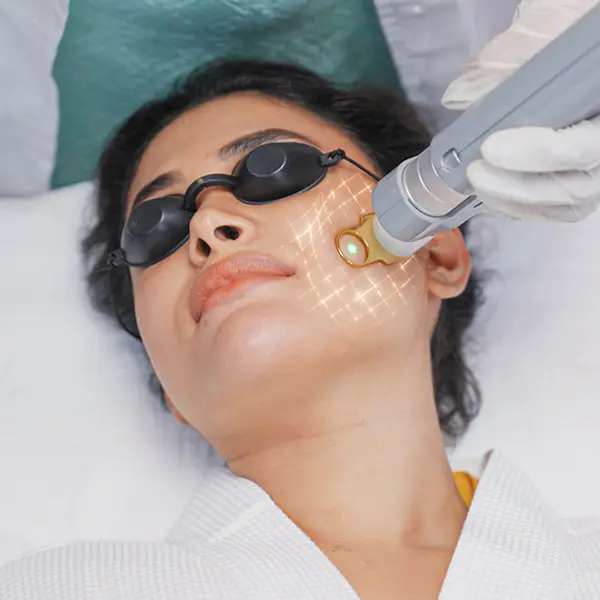Laser acne treatment has gained popularity as a highly effective, non-invasive solution for managing breakouts and reducing acne scars. But an important and often overlooked question is:
“Is laser acne treatment safe for all skin types?”
The short answer is: yes, but with caution and customization. Not all lasers are safe for every skin tone or type. The effectiveness and safety of laser treatment depend on multiple factors, including skin tone (Fitzpatrick skin type), skin sensitivity, and the type of laser used.
This guide breaks down what you need to know about laser safety across all skin types — from fair to deep skin tones — and how to choose the right treatment for your unique complexion.
Understanding Skin Types: The Fitzpatrick Scale
Dermatologists classify skin tones using the Fitzpatrick Skin Type Scale, which ranges from Type I to Type VI:
| Fitzpatrick Type | Skin Description | Sun Response |
|---|---|---|
| Type I | Very fair, pale, freckles | Always burns, never tans |
| Type II | Fair, light skin | Usually burns, tans minimally |
| Type III | Medium white to light brown | Sometimes burns, gradually tans |
| Type IV | Olive or moderate brown skin | Rarely burns, tans easily |
| Type V | Brown skin | Very rarely burns, tans easily |
| Type VI | Deep brown or black skin | Never burns, tans deeply |
However, when performed with appropriate technology and adjusted settings, laser treatments can be both safe and effective for deeper skin tones.
Best Laser Types for Each Skin Tone
Here’s a breakdown of which lasers are typically safe for each Fitzpatrick skin type:
| Laser Type | Safe For Skin Types | Best For |
|---|---|---|
| Nd:YAG Laser (1064 nm) | I–VI | Active acne, inflammation, oil control |
| Pulsed Dye Laser (PDL) | I–IV (sometimes V) | Red acne, rosacea, mild scarring |
| Fractional Non-Ablative | I–IV (some devices for V/VI) | Acne scars, texture |
| CO2/Ablative Lasers | I–III (rarely IV) | Deep acne scars (with risk for dark skin) |
| Blue Light Therapy (LED) | I–VI | Mild to moderate active acne |
| IPL (Intense Pulsed Light) | I–III (not for IV–VI) | Redness, pigmentation |
⚠️ IPL and Ablative Lasers in Dark Skin
IPL and aggressive resurfacing lasers (like CO2) carry a higher risk of discoloration or burns in darker skin tones and are generally not recommended unless performed by a laser specialist familiar with treating richly pigmented skin.
What Makes a Laser Treatment Safe?
To ensure safety and effectiveness for any skin type, the following elements are crucial:
✅ 1. Proper Laser Selection
Choose a laser that’s proven to be safe for your skin tone. For example:
- Nd:YAG for darker skin
- PDL or fractional lasers for lighter skin
✅ 2. Experienced Provider
Only seek treatment from a board-certified dermatologist or licensed provider who is trained in treating diverse skin tones. Improper settings or inexperienced handling can lead to burns or pigmentation issues.
✅ 3. Customized Treatment Settings
Lasers should be adjusted based on your:
- Skin tone
- Acne type or scar depth
- Sensitivity
- Medical history
✅ 4. Pre-Treatment Preparation
Pre-conditioning the skin may be recommended (e.g., with hydroquinone or retinoids) to reduce pigment risks in darker skin.
✅ 5. Post-Treatment Care
Follow all aftercare instructions, including:
- Avoiding sun exposure
- Using SPF 30+ daily
- Gentle skin care to reduce irritation
Alternatives If Laser Isn’t Ideal for You
If your skin type or condition doesn’t make you a good candidate for certain lasers, alternatives include:
- Chemical peels (gentle, salicylic or glycolic acid)
- Microneedling for acne scars
- LED light therapy
- Topical treatments (retinoids, azelaic acid)
These can also be used in combination with milder laser options to achieve great results safely.
Final Thoughts: Laser Acne Treatment Can Be Safe for All — With the Right Approach
Laser acne treatment is not one-size-fits-all, but with the right laser technology and professional expertise, it can be safe and effective for all skin tones.
If you have darker skin, choose a provider who specializes in treating richly pigmented skin and uses devices designed for your tone. For fair skin, more options are available, but expert care is still key to avoiding side effects and getting the best results.




